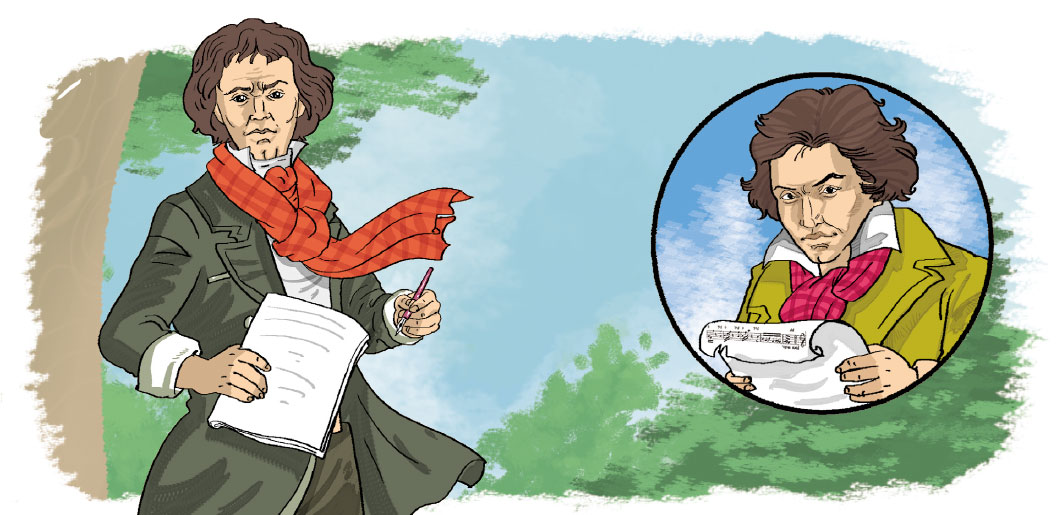
► Kênh hỏi đáp và giải thích thắc mắc kiến thức MIỄN PHÍ → truy cập LINK NHÓM: ENGLISH AMOM
► Kênh YOUTUBE hệ thống toàn bộ bài giảng CLIPS: truy cập LINK: ENGLISH AMOM CHANNEL
► Kênh TIKTOK: ENGLISH AMOM
1) Read the first part of the text about Bethoveen and fill each gap with a word from the box.
| greatest | innovator | created | prodigy |
| distinguished | compose | performance |
Ludwig van Beethoven was a German composer and (1) ..................... musical figure in the period between the Classical and Romantic eras. Born in 1770, in Bonn, Germany, he was the son of a court musician. His piano (2) ..................... quickly became evident and he gave his first public (3) ..................... at the age of eight. Beethoven's father wanted to make him a child (4) ..................... , another Mozart.
Considered the (5) ..................... composer of all time, he was a noted (6) ..................... , combining vocals and instruments in a new way. Beethoven continued to (7) ..................... even while losing his hearing, and some of his most important works were (8) ..................... during the last 10 years of his life, when he was quite unable to hear.
ĐÁP ÁN:
| 1. distinguished | 2. talent | 3. performance | 4. prodigy |
| 5. greatest | 6. innovator | 7. compose | 8. created |
2) Read the second part of the text and answer the questions.
There are three main periods in Beethoven's music career: early, middle and late.
The beginning of his early period was in 1792 when he moved to Vienna, Austria. Beethoven quickly made a name for himself as a talented pianist. His compositions during this period consisted mainly of works for his main instrument, the piano, and were classical in nature. However, Beethoven's hearing was beginning to deteriorate during this period, and he tried to hide this fact from those around him.

In 1800, Beethoven turned from the classical forms of the previous century to a more expressive or romantic music. His musical imagination began to grow beyond that of the piano. The middle period was believed to be Beethoven's greatest and most productive stage. In less than a decade, he produced countless masterpieces in every genre.
In 1809, however, his musical creativity began to decline, possibly due to his health problems and mental state. Beethoven stopped conducting and performing in public, but continued to compose – many of his most admired works were created during this period. By 1815, he was almost completely deaf and his manners became increasingly rude. In 1827, he died after a long illness. Nearly 20,000 people lined the streets of Vienna to pay their last respect to the composer who had changed the music scene of Western Europe.
1. When did the early period in Beethoven's music career begin?
2. What kind of music did he compose in his early period?
3. When was Beethoven at the peak of his career?
4. What kind of music did he compose then?
5. Why did he start losing his musical creativity?
6. Did he stop composing music in the late period?
7. Find the words or phrases in the text that describe Beethoven's talent and influence.
ĐÁP ÁN:
1. The early period in Beethoven's music career began in 1792.
2. He composed classical music mainly for his main instrument, the piano.
3. He was at the peak of his career in the middle period.
4. He started composing more expressive or romantic music in this period.
5. He started losing his musical creativity because of his health problems and mental state.
6. No, he continued to compose music even though he stopped conducting and performing in public.
7. A talented pianist; countless masterpieces; his most admired works; the composer who had changed the music scene of Western Europe.
3) Find the words or phrases from the two sections of the text which mean the following:
| 1. a person, especially a child or young person, having extraordinary talent or ability | ............................................................ |
| 2. a piece of music that is sung, rather than played on a musical instrument | ............................................................ |
| 3. become worse | ............................................................ |
| 4. producing or achieving a lot | ............................................................ |
| 5. too many to be counted | ............................................................ |
| 6. the best or most excellent works of an artist | ............................................................ |
| 7. a particular type of writing, art music etc which shares specific features | ............................................................ |
ĐÁP ÁN:
| 1. prodigy | 2. vocal | 3. deteriorate | 4. productive |
| 5. countless | 6. masterpieces | 7. genre |

